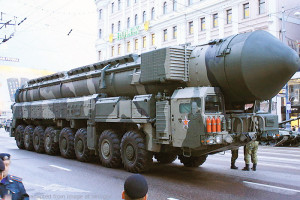U.S. Official: New START Treaty Should Cover Russian Weapon Systems Under Development

(Article text ©2020 RFE/RL, Inc., Radio Free Europe/Radio Liberty – rferl.org – March 10, 2020 – article text also appeared at rferl.org/a/us-official-new-start-treaty-should-cover-russian-weapons-systems-under-development/30479166.html)
An extension of the last remaining nuclear arms treaty between the United States and Russia should include new weapons systems that Moscow is developing, a U.S. State Department official said in a briefing on March 9.
The New Strategic Arms Reduction Treaty (START) is scheduled to expire on February 2021 and Washington has said a new accord should encompass “slightly exotic new systems such as the nuclear-powered, underwater, nuclear-armed drone called Poseidon; the nuclear-powered, nuclear-armed cruise missile, air-launched ballistic missile, and that sort of thing,” the official said.
The Trump administration has said it wants an extension of New START to also include China. The United States and Russia are the two signatories of treaty that went into effect in 2011.
China, the third-largest nuclear power, is on track to double its nuclear arsenal over the next decade, Christopher Ford, assistant secretary for international security and nonproliferation, told the Senate Foreign Relations Committee during a hearing on December 2, 2019.
However, China’s arsenal would still be less than half of that of the United States and Russia.
The nonproliferation agreement limits deployed strategic nuclear warheads and bombs held by the United States and Russia to 1,550, a reduction of nearly 75 percent from the 6,000 cap set by START 1, according to the Arms Control Association, a Washington-based, nongovernmental organization.
The treaty also allows for the verification of warheads held by each side.
It can be renewed for up to five years if both sides agree. Moscow has already offered to extend the treaty.
[featured image is file photo, of older existing nuclear missile]
